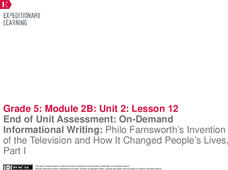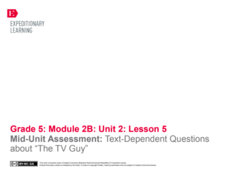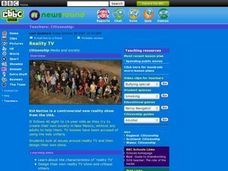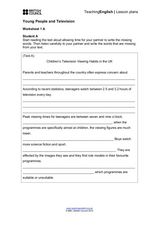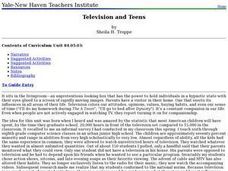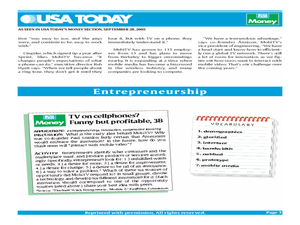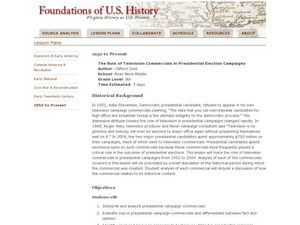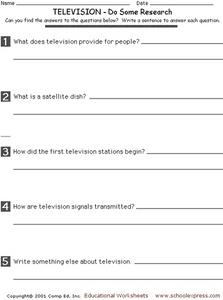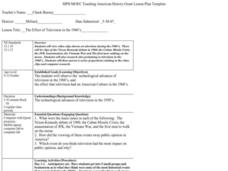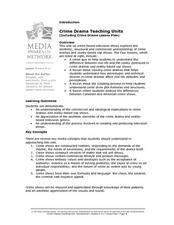EngageNY
End of Unit Assessment: On-Demand Informational Writing: Philo Farnsworth’s Invention of the Television and How It Changed People’s Lives, Part I
On-demand isn't just for TV anymore. Writers complete their end of the unit assessment with an on-demand writing task. They read the article Television and answer questions about the gist, vocabulary, and content. They then complete a...
EngageNY
Mid-Unit Assessment: Text-Dependent Questions about “The TV Guy”
Say hi to the TV guy. Readers finish their mid unit assessments by reading The TV Guy and answering text-dependent questions. Learners complete multiple choice as well as short and long answer questions pertaining to comprehension,...
EngageNY
Analysis, Reflection, and Introduction to the Painted Essay: The Invention of Television
Paint me a picture. Scholars complete a painted essay after examining the author's note in The Boy Who Invented TV. Learners identify various parts of the essay by using different paint colors and then complete task cards, using...
Curated OER
What Make Good Reality Television?
Students brainstorm what they believe makes a good reality TV show. Students compile a set of attributes that they feel distinguishes the best of the reality TV shows from the others. Using the attributes that the class agrees determine...
Curated OER
"Television"
In this reading comprehension instructional activity, students read a text about the beginnings of television. Students answer 10 multiple choice questions.
Curated OER
Television and Teens
Young scholars discuss the relationship teenagers have with the television. In groups, they watch different excerpts from various television shows and note every instance of violence including children. They also discuss the instances...
Curated OER
McGruff's TV Violence Scorecard
Young scholars watch television to identify the violence on studenT shows. They identify alternatives to settling conflicts other than in a violent manner. They share their scorecard with the class.
Curated OER
1950’s American Culture: Television, Fashion, and Music
Sixth graders investigate the impact of popular culture on Americans. In this 1950's America lesson, 6th graders view television clips, listen to audio clips, and look over fashion photographs from the decade. Students then discuss...
Curated OER
Words in the News: Carol Thatcher Wins TV Show
Students discuss what they know about reality television. In groups, they use new vocabulary words to match to its definition. They read an article and answer questions about reality television.
Curated OER
TV on Cell phones? Funny but Profitable
Young scholars explore the concept of technology. In this technology lesson, students read an article about television on a cell phone. Young scholars discuss why MobiTV was successful. Students discuss a technology and possible...
Curated OER
Newspapers or Television: What's Better?
Learners compare newspapers to television news and decide which they prefer. In this newspaper and television lesson, students read an article and watch a video of the same event. Learners discuss the differences, forming an...
Curated OER
My TV Guide
In this time worksheet, students record a TV log. Students include the name of the show, the day of the week, the start time, the end time, and the duration of TV watched.
Curated OER
The Role of Television Commercials in Presidential Election Campaigns
Eighth graders investigate the evolution of the presidential election campaign. In this media awareness lesson, 8th graders examine the use of television commercials during campaigns and their impact as they complete worksheets based on...
Curated OER
Diversity in Media: Looking Critically at What We See
This learning experience fosters awareness of representations we see, and don't see, in the media. Learners list TV programs, games, and films they enjoy, identify characters' ethnic, religious, (dis)ability, and sexual orientation...
Curated OER
Do Some Research- Television
In this research activity, students use the research method in order to answer the five questions. The activity is television themed.
Curated OER
The Effect of Television in the 1960’s
Students consider the impact of television on 1960's America. In this American culture lesson, students research selected Internet websites regarding the Nixon/Kennedy debate, the Cuban Missile Crisis, the Vietnam War, and the moon walk....
Media Smarts
Teaching TV: Learning With Television
As part of a series of resources focused on the influence of television, elementary students watch an educational program and identify the information presented and analyze the point of view from which the information is...
Curated OER
Writing a Television Advertisement
Pupils choose their favorite television show, craft and illustrate an advertisement for this show, and then write a short paragraph about why the show appeals to them. No provisions are made for children with limited or no viewing...
Curated OER
TV Weather Announcers
Elementary schoolers collect and record weather data for their local area using data from newspapers, Web sites, and television reports. The read and record data daily, and groups prepare a presentation on their findings for the entire...
Media Smarts
Facing TV Violence: Consequences and Media Violence
Make your class aware of the difference between media violence and real violence. Using prior knowledge, a video clip, and a worksheet, class members explore and discuss the unrealistic portrayal of violence in the media. Learners...
Curated OER
Tee-Hee T.V.
Students examine the concept of satire by reading lyrics to a song and reading "Soap and the Campus: A Web-Site Spoof Succeeds." They create treatments for parodies based on current television shows.
Curated OER
TV Violence Essay
In this language arts worksheet, students read the essay prompt about the effects of TV violence on young people. Students write an essay about their thoughts on TV violence.
Curated OER
Crime Drama Teaching Units
Investigate the nature of crime dramas on television. What exactly are they trying to portray? Questions and a comparison chart support learners as they watch shows from Canada, Great Britain, and the United States. An oral presentation...
Curated OER
Who Pays for My Favorite Television Program?
Ninth graders analyze media messages. In this media messages lesson plan, 9th graders identify techniques in television commercials that appeal to the senses and emotions. Students analyze the elements in example ads. Students keep...
Other popular searches
- Educational Television
- Television Cartoons
- Evaluating Television Content
- Crime Drama Television
- Images on Television
- Television and Film
- Television Broadcasting
- Television Commercials
- Westerns Movies Television
- History of Television
- Film and Television Production
- Pop Music on Television


